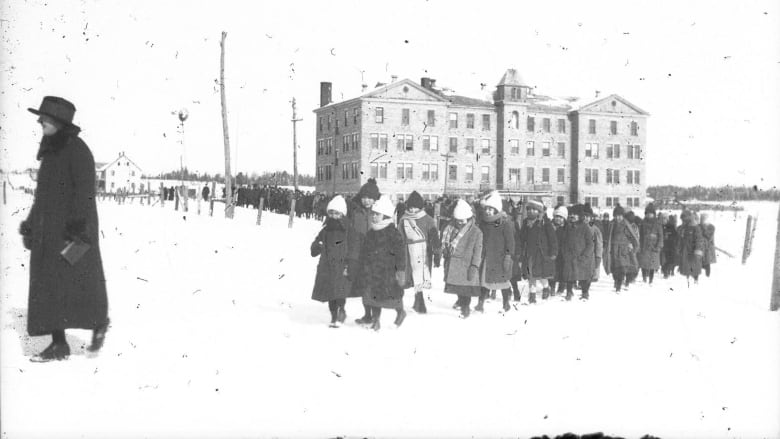Ontario First Nations to host ceremony before searching residential school site
Members of Sagamok Anishnawbek, Mississauga, Serpent River First Nations to gather Saturday in Spanish

WARNING: This story contains details some readers may find distressing.
Three northeastern Ontario First Nations will host a ceremony Saturday to ask the children buried at residential schools if it's OK to search for their graves.
Members of the Sagamok Anishnawbek, Mississauga and Serpent River First Nations will gather at the site of the former Spanish Indian Residential Schools, one for boys and one for girls, in the town of Spanish for the ceremony.
Sagamok Anishnawbek Chief Alan Ozawanimke said asking permission is needed before the resting places of the children is disturbed.
"We know that if given the permission that this will take a long time," he said. "And we are seeking that support, up to and including the opportunity to acquire those lands where the children are buried."
Ozawanimke said the communities plan to apply for federal and provincial funding to conduct the searches.
Last month the federal government committed $321 million to help Indigenous communities search burial sites at former residential schools and support survivors and their communities.
"Since late May, a number of Indigenous people have contacted our government to share that they are now reliving the experiences they have worked so hard to move on from, opening up old wounds they thought they had healed," Indigenous Services Minister Marc Miller told the CBC when the government announced its funding.
The Ontario government set aside an additional $10 million over a three-year span to identify, investigate and commemorate residential school burial sites in the province.
At the time of that announcement, Ogichidaa Francis Kavanaugh, grand chief of the First Nations in Treaty 3 territory in northwestern Ontario and Manitoba, said news around residential schools in Canada has reopened old wounds for Indigenous people.
"There's going to be more remains found," Kavanaugh said.
There were 18 residential schools in Ontario, with the last one closing in 1991, according to the province. Some sites have since been repurposed, abandoned or destroyed.
Unmarked graves discovered across Canada
In May, Tk'emlúps te Secwépemc First Nation in British Columbia revealed preliminary results from a survey of the grounds at the former Kamloops Indian Residential School that detected the remains of more than 200 children could be buried at the site.
The revelation prompted First Nations across Canada to search the sites of former residential schools for unmarked graves.
In June, the Cowessess First Nation in Saskatchewan announced a preliminary finding of 751 unmarked graves at a cemetery near the former Marieval Indian Residential School.
Support is available for anyone affected by their experience at residential schools, and those who are triggered by the latest reports.
A national Indian Residential School Crisis Line has been set up to provide support for survivors and those affected. People can access emotional and crisis referral services by calling the 24-hour national crisis line: 1-866-925-4419. A Saskatchewan-based line is now available by calling 306-522-7494.
With files from Erik White